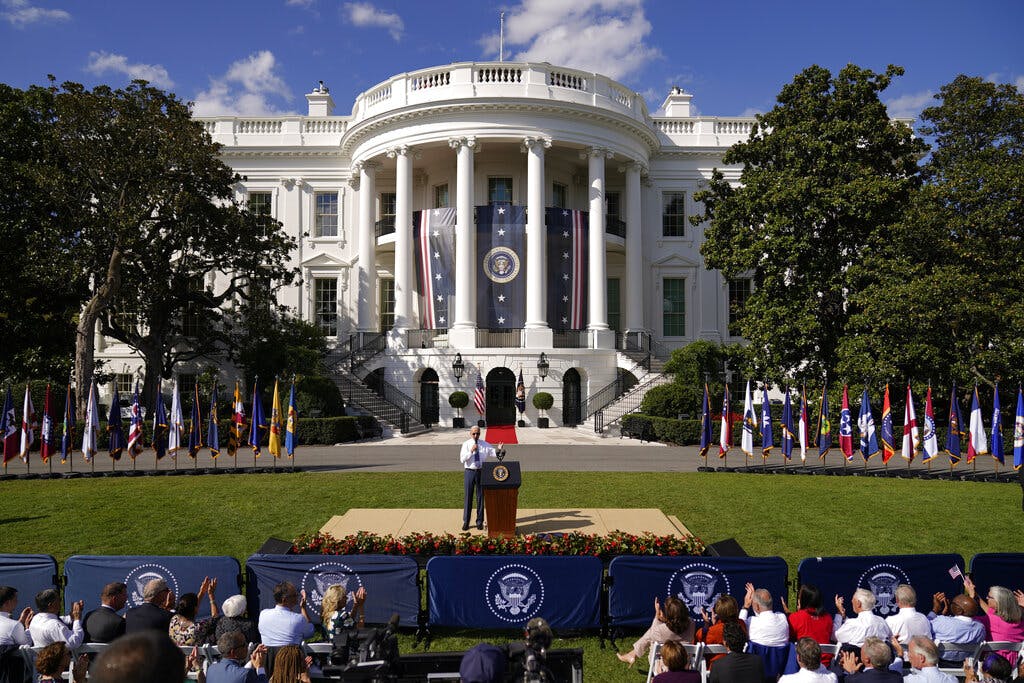Biden ‘Inflation Reduction Act’ Victory Lap Tarred by … More Inflation
Biden welcomed hundreds of guests — politicians, environmental activists, union workers, and Cabinet secretaries among them — to the South Lawn for a celebration of the so-called Inflation Reduction Act.

President Biden’s attempted victory lap following recent legislative triumphs was marred Tuesday by reports that inflation is stubbornly high and that runaway federal spending covering everything from climate change to student loan forgiveness to the war in Ukraine is rampant.
Mr. Biden welcomed hundreds of guests — politicians, environmental activists, union workers, and Cabinet secretaries among them — to the South Lawn for a celebration of the so-called Inflation Reduction Act passed by Congress just before the August recess.
Calling the bill “one of the most significant laws in our nation’s history,” the White House offered it up as “further proof that the soul of America is vibrant, the future of America is bright, and the promise of America is real.”
Signed by the president last month, the measure — while aimed at healthcare and energy costs to an extent — has little to do with inflation. It primarily locked in new corporate tax increases and hundreds of billions of dollars in spending for clean energy initiatives to address climate change and additional resources for the Internal Revenue Service.
At Tuesday’s fete — complete with an impromptu concert by musician James Taylor — Mr. Biden took aim at Republicans who refused to get behind the act, which was passed along strict party lines with Vice President Harris casting the tie-breaking vote in the Senate.
“I believe Republicans could’ve and should’ve joined us,” Mr. Biden said.
Only hours before the event, the Bureau of Labor Statistics reported that consumer prices rose at an annual rate of 8.3 percent in August, the 27th straight month of rising inflation. Particularly worrisome for some struggling Americans were reports that grocery prices continue to climb at a dizzying pace. In the past year, they have soared 13.5 percent — the biggest 12-month increase since 1979.
After reading the consumer price index report, one Wall Street economist, Rob Dent of Nomura, echoed the sentiments of many others by saying that “there is no good news across this report.”
In a statement released just before the stock market dropped precipitously because of the inflation report, Mr. Biden attempted to put a positive spin on the data, suggesting that overall prices have been flat for the past two months and gas prices are declining.
“My economic plan is showing that, as we bring prices down, we are creating good paying jobs and bringing manufacturing back to America,” Mr. Biden said.
Economists outside the administration are skeptical that the bill championed by Mr. Biden Tuesday will do much to curb inflation, however. Estimates by the Tax Foundation suggest the act may actually worsen inflation by constraining the country’s economic productivity.
“On balance, the long-run impact on inflation is particularly uncertain but likely close to zero,” the group said.
The Tax Foundation and others initially cheered portions of the Inflation Reduction Act that would have decreased the federal budget deficit by as much as $224 billion over the next decade. Only days after signing the bill, however, Mr. Biden announced his student loan forgiveness plan, which wipes out those gains — and then some — and will cost taxpayers anywhere from $469 billion to $519 billion over the next decade.
In a report released Tuesday, the bipartisan Committee for a Responsible Federal Budget said the Biden administration has during its first two years in office committed to borrowing nearly $5 trillion for the Inflation Reduction Act and other executive initiatives — twice what President Trump had spent at the same point in his administration.
The $4.8 trillion in spending by the Biden administration is less than the roughly $7.5 trillion President Trump added to the deficit during his entire term — $3.5 trillion of Mr. Trump’s borrowing was for non-Covid-related spending — but more than the $2.5 trillion in spending he had enacted at this point in his tenure.
Such “excessive borrowing will lead to continued inflationary pressures, drive the national debt to a new record as soon as 2030, and triple federal interest payments over the next decade – or even sooner if interest rates go up faster or by more than expected,” the committee said.

